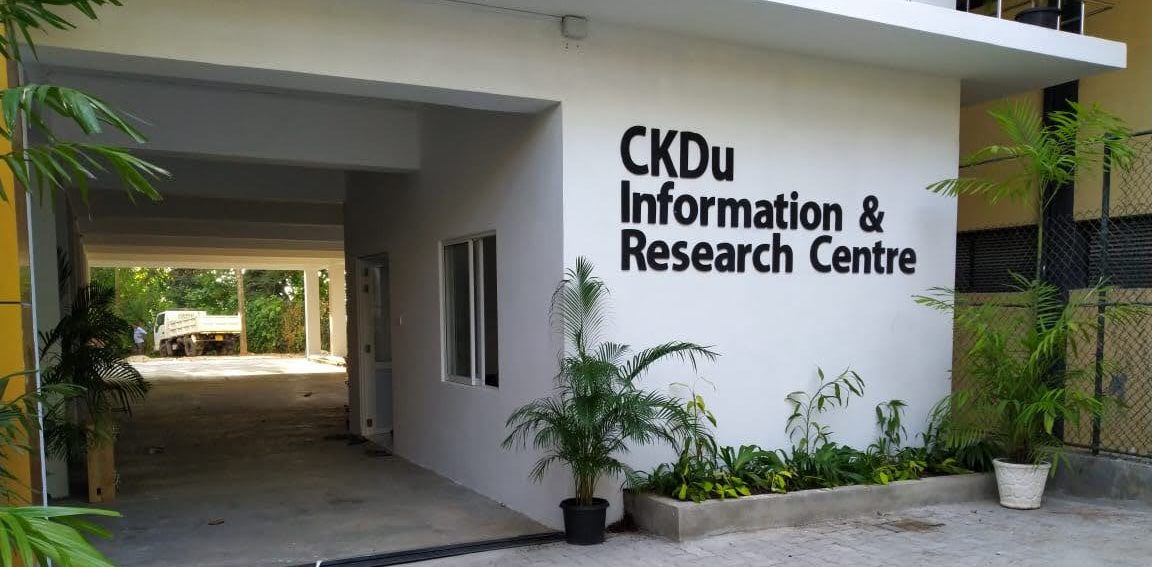
Project of Establishing the CKDu Research and Information Centre, University of Kelaniya, Sri Lanka
This project was established to find the root cause of the Chronic Kidney Disease of unknown etiology (CKDu) prevalence in most of the dry zone areas in Sri Lanka.
The CKDu Research and Information Centre (CRIC)
The CKDu Research and Information Centre (CRIC) is committed to high-calibre research focusing on several thematic research areas, including water quality, soil and sediment quality, food safety, water purification techniques, graphite/nano filter material development, natural waste filter material development, toxicology and microbiology to investigate the root causes for the prevalence of CKDu in Sri Lanka.
The Centre aims to conduct research on the causes, prevention, and management of CKDu and to provide a platform for the exchange of information and knowledge on the disease. The Centre also aims to educate and raise awareness about CKDu among the community, healthcare professionals, and policy makers



Chronic Kidney Disease of unknown etiology (CKDu)
CKDu, also known as Chronic Kidney Disease of unknown origin, is a rapidly increasing health problem in Sri Lanka. The disease has affected mainly the agricultural communities in the dry zone of the country, with a high prevalence in the North Central, Uva, and Eastern provinces. The causes of CKDu are still not fully understood, but it is believed to be related to multiple factors, including environmental, occupational, and genetic factors.
Research activities & Research Capacity
The CKDu Research and Information Centre is dedicated to understanding and addressing the issue of Chronic Kidney Disease of unknown origin (CKDu) in Sri Lanka. The Centre conducts a variety of research projects aimed at identifying the causes of CKDu, as well as developing strategies for prevention and treatment.
One of the main research activities at the Centre is the study of the potential environmental and occupational factors that may contribute to the development of CKDu. This includes investigating the levels of heavy metals and other toxins in water, food, and soil in areas affected by CKDu. In addition, the Centre is also studying the nutritional status of individuals affected by CKDu, and the potential role of dietary factors in the development of the disease.
Another important research activity at the Centre is the study of the genetic and epidemiological factors that may contribute to the development of CKDu. This includes investigating the prevalence and distribution of CKDu in different populations.
The Centre employs a variety of research methods to investigate the causes of CKDu and develop strategies for prevention and treatment. These methods include,
- Laboratory-based research
- Field-based research
- Epidemiological studies
Laboratory-based research focuses on identifying and quantifying environmental contaminants, such as heavy metals and pesticides, in various matrices, including water, soil, sediment, food, crops, and biological tissues. We also investigate the potential impact of these contaminants on kidney cells using in vitro and in vivo models. Furthermore, we develop and evaluate new materials for water purification to mitigate exposure to these contaminants
Field-based research is conducted in areas affected by CKDu to investigate the potential environmental and occupational factors that may contribute to the development of the disease. This includes collecting water, food, and soil samples, as well as conducting surveys and interviews with individuals affected by CKDu.
Epidemiological studies are also conducted to investigate the prevalence and distribution of CKDu in different populations, as well as to study the genetic susceptibility of individuals to the disease.
Results and findings of the research projects
The research on Chronic Kidney Disease of Unknown etiology (CKDu) has been a growing field in recent years, with many studies being conducted to understand the causes and potential solutions for this debilitating disease. The CKDu research center has been at the forefront of this research.
Explore the research findings from our CKD research center by visiting our ResearchGate page
Research resources and instruments
The Centre is equipped with a variety of resources and facilities to support the research efforts of undergraduate and postgraduate students. The main instruments and equipment available at the Centre include ICP-MS, LC-MS/HPLC, and IC.
These instruments and equipment are used to support a wide range of research projects, including those in the areas of analytical chemistry, environmental science, and materials science.









Research Team and Students
Director: Prof. (Mrs.) J. A. Liyanage (Link)
Coordinator: Prof. W. A. P. J. Premaratne (Link)
Student List
Current Students
- Dilshani Sakunthala
- Darshana
- Kalani
- Sahan Perera
- Nalin Gunathilaka
Previous Students
